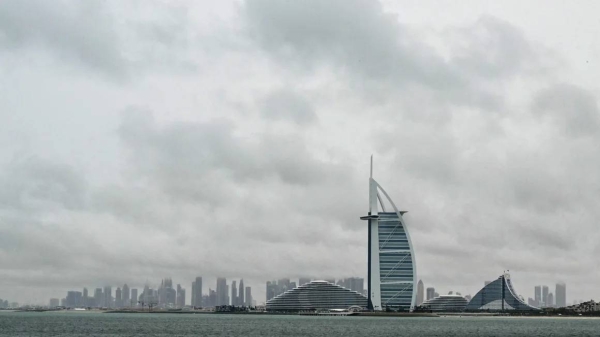Heavy rains returned to the United Arab Emirates, causing Emirates to cancel and delay several flights in and out of Dubai. The storm comes just two weeks after record-setting rainfall triggered damaging floods in several parts of the country and neighboring Oman. The floods resulted in the deaths of at least four people in the UAE and 19 others in Oman. The coastal city of Ras Al-Khaimah experienced strong winds and heavy rains, with footage showing palm trees bending and lightning illuminating the sky.
Despite the rainfall not being as heavy as the previous event, Dubai received 20 millimeters in 12 hours, more than double its usual total for April and May combined. Abu Dhabi saw 34 mm in 24 hours, more than four times its typical rainfall for the same period. Residents appeared better prepared this time, with workmen opening drains on the streets ahead of the rainfall and emergency notifications sent out widely to warn people to stay home where possible. Authorities ordered remote working and studying and closed off roads to flood-prone areas.
Scientists have linked the record rainfall to climate change. A team of 21 researchers found that extreme rainfall events in the UAE and Oman have become 10-40% more intense due to global warming. The previous event two weeks ago saw the UAE experience its heaviest rainfall in 75 years, with Dubai receiving the equivalent of more than a year and a half’s worth of rain in less than 24 hours. As a result, authorities are taking measures to better prepare for extreme weather events and to mitigate their impact on residents.
The heavy rains have prompted Emirates to cancel and delay flights in and out of Dubai, a major international airport. The storm comes shortly after damaging floods hit the UAE and Oman, resulting in multiple fatalities. Residents in affected areas were instructed to work and study from home, while roads to flood-prone areas were closed off. The UAE experienced unusually high levels of rainfall, with Dubai receiving more rain in 12 hours than it typically does over two months. Abu Dhabi also saw higher than usual rainfall, prompting authorities to take precautionary measures.
Residents in the UAE appeared to be more prepared for the heavy rains this time, as workmen were seen opening drains on the streets ahead of the storm. Emergency notifications were sent out to mobile phones to warn people to stay home where possible. Scientists have attributed the increased intensity of extreme rainfall events in the UAE and Oman to climate change. A team of researchers found that global warming has made such events between 10 and 40% more intense. Authorities are working to implement measures to better prepare for future extreme weather events and to protect residents from their impact.
The record rainfall in the UAE and Oman two weeks ago was linked to climate change, with researchers finding that global warming has made extreme rainfall events more intense in these countries. The UAE experienced its heaviest rainfall in 75 years during that event, with Dubai receiving more rain in less than 24 hours than it typically does in a year and a half. As a result, authorities are taking steps to address the impact of climate change on extreme weather events and to protect residents from the consequences. Efforts are being made to better prepare for future storms and to mitigate their effects on the population.











